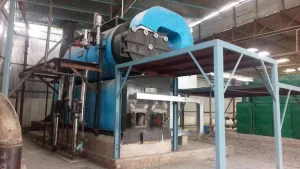The Industrial steam boiler is required in Plywood industry to dry the moisture content in the wood. After the removal of moisture, ply becomes strong and long-lasting. For removal of moisture, drying operations are carried out. Moisture content may be different in various kind of plys so the time taken to dry the moisture may vary. The time required for removal of moisture would depend upon the thickness and density of wood.
Various Methods are used to dry the plywood. One of the most commonly used methods is steam contact methods. In this method steam obtained from the boiler is directly used to dry the plywood.

The other method used is by the heat from the Thermic Fluid Heaters. Thermic Fluid Heaters are heating equipment, used in industry where heat transfers are primary need of process instead of pressure.
Drying is carried out in the plywood industry mainly fr two major products, one Plyboards and second peeled wood sheets like veneer. Depending on the thickness boards take more time to dry in comparison to veneer sheet.
The boiler is used in various processes in wood processing industries:
- Disinfect: To cleanse of infections and destroy Deemak
- Extraction: Extraction in chemistry is a separation process consisting of the separation of a substance from a matrix.
- Drying: By removal of moisture wood would become strong, stable and long-lasting.
- Curing: Curing Also involve drying by addition of certain salts for toughening and hardening of Planks
- Sterilizing: Refers to the elimination of fungus, bacteria, spores by the method of dry heating.
- Packaging: For making packaging material so that plywood can reach the market securely
- Wood Preservation: wood will have become strong and long-lasting.
- Anti flaming: fire retardant treatment for wood and timber is done to make its lifespan long
- Mothproof: Chemical treatment so as to repel wood moth that can spoil the wood.
- Coking: To convert wood into coke which is used as fuel.
- Degrease: To remove grease or oil from the surface to give a matt finish.
We, at Thermodyne Boilers, have manufactured, supplied and commissioned Steam Boiler for Plywood Industry for many of our Clients. And their continuous operation with time has ensured the reliability that we consistently work upon.
Specification and types of Boilers for plywood industry manufactured by Thermodyne Boilers:
It is unique design most efficient and highly effective heating equipment
Capacity: 1 Lac Kcal/hr – 50Lac Kcal/hr
Fuel: Wood, Coal, Bagasse, sawdust etc
Combi boiler is a combination of a water tube boiler and smoke tube boiler.
Capacity: 1 TPH to 15 TPH
Pressure: upto 21kg/Cm2
Fuel: Coal, Lignite, Rice Husk, Wood, Bagasse,
Groundnut shells, Petc oke, and several other fuels
It is unique design conventional 3 pass smoke tube design internal furnace packaged type boilers.
Capacity: 0.3 TPH to 4 TPH
Pressure: upto 21kg/Cm2
Fuel: Coal, Lignite, Rice Husk, Wood, Bagasse,
Groundnut shells, Petcoke and several other fuels
It is skid mounted compact design Combi Boiler.
Capacity: 1 TPH to 15 TPH
Pressure: upto 21kg/Cm2
Fuel: Coal, Lignite, Rice Husk, Wood, Bagasse,
Groundnut shells, Petcoke and several other fuels
How to Select a Boiler for Plywood Industry:
- Calculate or determine the capacity of the Steam Boiler: The boiler capacity must be based on the heating load including the heat losses in boiler or pipelines
- Calculate or determine the boiler heating parameters (Pressure, Temperature etc.)
- Determine the Steam Boiler Efficiency: For economical benefits, the boilers must have high thermal efficiency, the boiler output, quantity
- It is better to select the Steam Boilers with required capacity and combustion equipment based on proper calculations.
- The design of the boiler should be efficient and as per the requirement of the industry
If you are looking steam boilers for Wood Processing Industry or Plywood Industry then…
Get An Instant Quotation:
Also Visit Our Youtube Chanel: Industrial Boilers
Steam Boilers in the Plywood Industry FAQ
1. What is a boiler?
A boiler is a device that generates steam or hot water. Boilers are used in a variety of industries, including the plywood industry.
2. What is plywood boiler ?
Plywood is a manufactured wood product made from thin sheets of wood veneer that are glued together under high pressure and temperature. Plywood is used in a variety of applications, including construction, furniture, and flooring.
3. What is the role of boilers in the plywood industry?
Boiler are used in the plywood industry to generate steam that is used to dry the wood veneers before they are glued together. Steam is also used to heat the glue that is used to bind the veneers together.
4. What are the different types of boilers used in the plywood industry?
There are two main types of boilers used in the plywood industry: fire-tube boilers and water-tube boilers. Fire-tube boilers have a firebox that heats tubes that carry water or steam. Water-tube boilers have tubes that carry water or steam that are surrounded by a firebox.
5. What are the factors to consider when choosing a boiler for the plywood industry?
The factors to consider when choosing a boiler for the plywood industry include the size of the boiler, the type of fuel that will be used, the efficiency of the boiler, and the cost of the boiler.
6. What are the benefits of using boilers in the plywood industry?
Boiler offer a number of benefits in the plywood industry, including:
Increased productivity: Boilers can help to increase productivity in the plywood industry by reducing the time it takes to dry the wood veneers and by providing a consistent source of heat for the glue.
Improved quality: Boilers can help to improve the quality of plywood by ensuring that the wood veneers are evenly dried and that the glue is evenly applied.
Reduced costs: Boilers can help to reduce costs in the plywood industry by reducing the amount of energy that is used to dry the wood veneers and by providing a more efficient way to heat the glue.
7. What are the drawbacks of using boilers in the plywood industry?
The drawbacks of using boilers in the plywood industry include:
Boilers can be expensive to purchase and install.
Boilers require regular maintenance and inspection.
Boilers can be a safety hazard if they are not properly operated and maintained.
8. What are the safety precautions that should be taken when using boilers in the plywood industry?
The safety precautions that should be taken when using boilers in the plywood industry include:
Boilers should always be operated by trained personnel.
Boilers should be regularly inspected and maintained.
Boilers should be properly ventilated to prevent the buildup of carbon monoxide
Boilers should be located in a safe area away from flammable materials.
9. What are the environmental impacts of using boilers in the plywood industry?
The environmental impacts of using boilers in the plywood industry include:
Boilers can emit pollutants into the air, including carbon monoxide, nitrogen oxides, and sulfur dioxide.
Boilers can also consume a significant amount of water.
10. What are the future trends for boilers in the plywood industry?
The future trends for boilers in the plywood industry include:
The use of more efficient boilers that emit fewer pollutants.
The use of boilers that can operate on renewable fuels, such as biomass and solar energy.
The development of new technologies that can improve the safety and efficiency of boilers.








